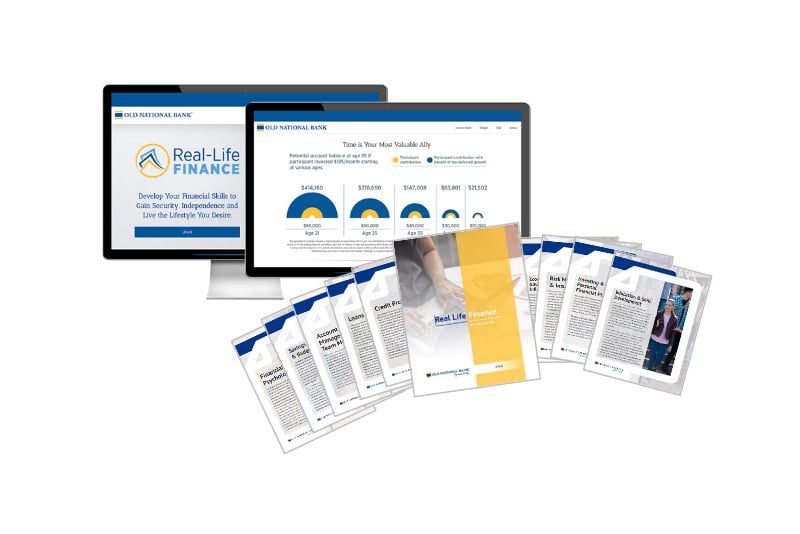Providing and Supporting Financial Education Is a Major Focus for Old National
Old National has created a program to guide your employees toward financial wellness, equipped with a team of over 95 licensed instructors located across our footprint.

Old National has created a program to guide your employees toward financial wellness, equipped with a team of over 95 licensed instructors located across our footprint.
Real-Life Finance
Our very own branded curriculum on a digital platform or in-person workshop for your organization!

Real-Life Finance offers a robust online platform and Learning Management System designed around evidence-based best practices for eLearning.
![]() User Experience
User Experience
![]() Instructional Methods
Instructional Methods
![]()
Interactive Content
![]()
Adaptive Learning
![]() Action & Behavior Molding
Action & Behavior Molding
![]() Gamification
Gamification
![]()
Comprehensive Assessments
![]()
Accessibility
Many factors influence and reinforce people’s relationships with money, and each of us have an individual money personality. Our emotions about money affect how we spend, save, and manage our personal finances.
Enjoying life now while simultaneously planning for a secure future requires a solid grasp of how and where your money is spent day-to-day. Writing a clear budget is an important step toward financial wellness. A well-written budget and savings plan allows enough money to spend on things you want now, while still ensuring that you have plenty for later.
Financial accounts form the centerpiece of one’s personal finances and building strong relationships with a bank or credit union benefits one’s financial situation throughout life. Managing accounts professionally and efficiently helps people stay organized, earn interest, and build a foundation for future investments.
Credit is defined as the ability to obtain products and/or services in advance with the agreement to make payments toward the outstanding balance over time. Having and keeping a good credit profile saves people thousands of dollars. Credit card companies, auto lenders, mortgage brokers, and banks review credit reports to determine whether they trust an individual to repay borrowed money.
Making educated debt decisions can make a huge difference to one’s financial future. Distinguishing between “good” debt and “bad” debt, evaluating loan options, managing debt load, and creating a debt payoff plan helps move people toward their long-term financial goals.
Financial exploitation happens when someone illegally or improperly uses another’s money, property or other resources for their own benefit. Some types of financial abuse include taking your money or property without your permission, forging your signature on a check or loan or legal document, deceiving, coercing, or exerting undue influence to get you to sign a deed, will or power of attorney and using your property or possessions without permission.
Every financial decision contains an element of risk. There are methods — such as buying insurance — to protect oneself from financial risk. Various types of insurance policies include those that cover real property, automobiles, health, and life. A person’s insurance coverage needs will change over time.
Taxes represent one of the largest budget items for U.S. citizens, representing a significant expense that affects financial health. Furthermore, tax errors carry heavy consequences. Tax planning is a critical component of an overall investment plan. Financial products and strategies exist to help people pay fewer taxes within the law and make tax-efficient financial decisions.
Reaching lifestyle goals and financial security in retirement requires saving and investing money. Significant reductions in pension plans and Social Security coupled with longer life expectancies mean that we need to invest much more than people did 50 years ago. Investment gets our money working for us, rather than us having to work to earn every dollar.
This lesson will prepare you for real estate ownership. Whether you want to purchase a home to live in or buy a rental property to generate income, these budgeting activities will help you understand the expenses involved in buying real estate and give you the knowledge you need to determine whether any property purchase is aligned with your long-term financial goals.
While obtaining higher education may offer a competitive edge toward obtaining professional employment, it also may involve going into debt. There are many options for education including traditional university, career college, vocational school, and more. We should only pursue education that allows us to follow our passions yet remains in alignment with our budgets, timelines, and long-term financial goals.
Real-Life Finance eLearning Enrollment Form
Old National provides Real-Life Finance to our business and non-profit clients. This eLearning course provides 46 lessons on 11 personal financial topics to help individuals in your organization improve their financial wellness. Complete the form below to enroll in Real-Life Finance and we will respond to your request as soon as possible.
This is a link to a third-party site. Note that the third party's privacy policy and security practices may differ from the standards of Old National Bank. Complete details regarding third-party links are available in our Terms of Use.
Residents of California have certain rights regarding the sale of personal information to third parties. Old National Bank, our affiliates, and service providers use information collected through cookies or in forms to improve the experience on our site and pages, to analyze how our site is used, and to present personalized advertising.
At any point, you can opt-out of the sale of your personal information by selecting Do Not Sell My Personal Information.
You can find more information and how to manage your privacy choices by reviewing our California Consumer Privacy Disclosures located on our Privacy information page by following the link on the bottom of any page.